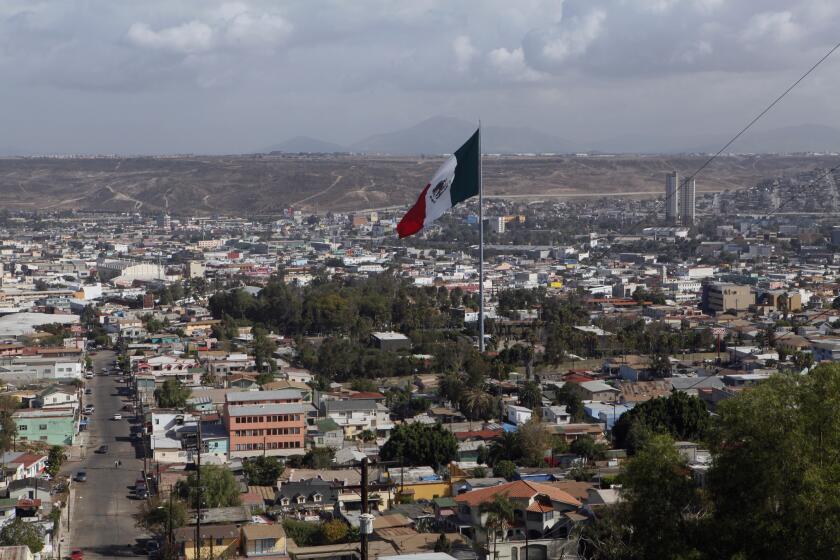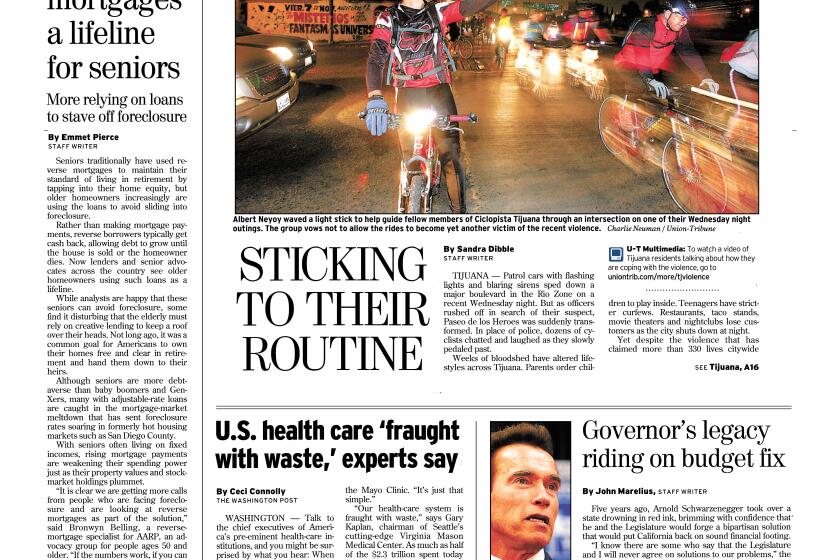Focus: NAFTA in U.S. campaign spotlight
Since passage of the North American Free Trade Agreement more than two decades ago, U.S.-Mexico trade has risen to unprecedented levels. Trucks cross into the United States laden with shipments of medical devices, electronics, cars, fruits and vegetables, while others roll south into Mexico with loads of U.S. electronic equipment, machinery, plastics and agricultural products.
NAFTA created new jobs, brought consumers a wider range of choices, increased the integration of the U.S. and Mexican economies and enhanced North America’s global competitiveness, supporters say. A report by the Wilson Center in Washington, D.C., states that six million U.S. jobs depend on trade with Mexico. A University of Chicago survey of top U.S. economists showed a majority agreeing that Americans have been better off under the treaty.
“Mexico is our teammate,” said economist Gordon Hanson, director of the Center on Global Transformation at the University of California San Diego. “When you look at manufacturing in the U.S., you have to look at manufacturing in the U.S., Canada and Mexico.”

Is NAFTA really to blame for the loss of American manufacturing jobs?
But critics say that NAFTA has exacted a heavy toll, costing many U.S. workers their well-paid factory jobs and and driving down wages as companies move operations across the border to take advantage of lower Mexican costs.
The U.S. presidential campaign has brought renewed scrutiny to NAFTA and other trade agreements that have followed. China’s rapid rise as a trade power following its acceptance into the World Trade Organization in 2001, and a pending free trade agreement among 12 Pacific Rim countries — the Trans-Pacific Partnership — have further fueled the debate.
Republican candidate Donald Trump has vowed to renegotiate NAFTA, launched in 1994 with Canada and Mexico — or possibly cancel it altogether.
“I think NAFTA has been a disaster,” Trump said in a CNN interview this summer. “I think our current deals are a disaster. ... Mexico is smart, they have out-negotiated us to a fare-thee well. They’re going to be the capital of automobiles pretty soon, the way they’re going.”
Hillary Clinton, the Democratic candidate, has also called for re-negotiating NAFTA. A campaign statement said that “she would review all of our trade agreements with the same scrutiny,” and that she vows to “crack down on companies that ship jobs and earnings overseas and create incentives for companies to bring back jobs to the U.S.”
As a general position, “you’re not going to find any mainstream economist that thinks we need to close our markets,” said James Gerber, a San Diego State University economics professor. He sees the debate over NAFTA as a “tempest in a teapot.”
“I don’t think that it’s done any harm to the U.S., and I think it’s been beneficial to Mexico,” Gerber said.
As the political debate continues, here are some of these issues raised by the candidates and their supporters.
Why trade at all?
For nearly two centuries, economic theory has held that countries benefit from trade through their comparative advantage in producing a particular good or service. Open economies “tend to grow faster and more steadily than closed economies, and economic growth is an important factor in job creation,” according to the World Trade Organization.
But lower-priced imports can also lead to job losses in industries vulnerable to foreign competition. And governments have routinely raised revenue and protected domestic industries by raising tariffs.
“We know that when you open to trade, it’s going to shift what you do,” said Gerber. “You’re going to focus on where you have a comparative advantage.”
Free trade proponents say it benefits consumers by lowering prices and offering them a greater array of choices. But critics warn that without proper rules, the opening of markets to foreign products lead to abuses that hurt important economic sectors. Practices such as currency manipulation can artificially lower export prices. Subsidies and dumping — the practice of selling exported items for less than the cost of producing them — can also be used to alter the trade balance.
What been the effect of NAFTA?
NAFTA, an accord that envisioned a giant trade bloc formed by the United States, Canada and Mexico, went into effect on Jan. 1, 1994. By 2008, most tariffs among the three countries had been eliminated.
Since the treaty’s inception, two-way trade between the United States and Mexico has boomed from about $81 billion in 1993 to the current level of approximately $580 billion, straining the customs infrastructure on the U.S.-Mexico border, including at the Otay Mesa Port of Entry.
Under NAFTA, the U.S. and Mexican economies have grown increasingly integrated, often through manufacturing operations on both sides of the border. A report by the Wilson Center in Washington, D.C., says “a full 40 percent of the content of U.S. imports from Mexico was originally produced in the United States, and it is likely that the domestic content in Mexican imports from the United States is also very high.”
Though trade volumes are closely tracked, the number of jobs gained or lost due to trade has proven more difficult to count.
NAFTA critics say numerous U.S. jobs have been lost over the past two decades because of the trade deficit with Mexico. The pro-labor Economic Policy Institute in Washington, D.C., estimates that 850,000 U.S. jobs were displaced from 1993 to 2013 as a result of the deficit.
“There’s no question that NAFTA led to a great wave of outsourcing of domestic production, and it encouraged firms to move hundreds of thousands of jobs from the U.S. to Mexico,” said the EPI’s Robert Scott, whose research often has been used in political campaigns.
UCSD’s Hanson cited forces besides trade with Mexico that have have been buffeting the U.S. manufacturing sector, factors such as rapidly changing technology and rising competition from China.
“The U.S. has lost manufacturing jobs since NAFTA, but we cannot categorically say that much of that change at all was due to NAFTA,” he said.
Lorenzo Caliendo of Yale University worked with other economists in a 2015 study of the effect of NAFTA’s tariff reductions on the U.S. economy. They concluded that “Mexico gained more than the United States, but both countries were better off,” he said.
Caliendo said that his research showed that “aggregate welfare, measured as the average change in real income, in the U.S. went up because of NAFTA’s tariff reductions.”
NAFTA’s proponents argue that it has allowed U.S. companies to survive competition from other parts of the world by moving manufacturing operations to Mexico. “The fact that we co-produce translates into more competitiveness for the region, and that allows the U.S. to compete against China,” said economist Luis de la Calle, who served on Mexico’s NAFTA negotiating team.
“North America is like a production assembly line. In Mexico, because we have a younger and more abundant labor force, we tend to participate in the last stages of the production process,” de la Calle said. “In the U.S., “you produce the high value-added components, the engineering.”
The big concern seems to be trade with China. What do we know about its effects?
The Economic Policy Institute has reported that 2.4 million U.S. manufacturing jobs have been lost from 2001 to 2013 due to a rising trade deficit with China. A study by Yale’s Caliendo and two other economists came up with a lower number, estimating 800,000 U.S. manufacturing jobs lost to the opening of trade with China.
In a 2012 University of Chicago survey, most economists agreed that “most Americans are better off” due to trade with China, because of the availability of cheaper goods. But they also agreed that those “who work in the production of competing goods, such as clothing and furniture” are worse off.
Unlike Mexico, China’s production “is much less integrated into the U.S. production structure,” said Hanson. “There have certainly been manufacturing areas in the United States that have been hit by expanding trade with China.”
For the past several years, Hanson has been working with two other economists —David Autor of Massachusetts Institute of Technology and David Dorn of University of Zurich — on a study of these manufacturing regions.
Their study has found voters in these areas have tended to become politically polarized: those in predominantly white areas moved “strongly toward very conservative Republicans,” Hanson said, while in those with a majority non-white population that were initially Democrats, “you saw a movement toward liberal Democrats.”
What would happen if NAFTA were canceled or renegotiated?
“Free trade is supposed to be just that,” said Hanson. “When I hear people say they want to renegotiate NAFTA, I interpret that to mean that they want to raise barriers to trade. That would make the U.S. economy overall less competitive in dealing with China and dealing with competitors in the rest of the world.”
Though not supportive of NAFTA, Scott of the Economic Policy Institute said he does not advocate renegotiating the treaty. “It’s a done deal,” he said, adding that “we could do more to help Mexico grow and that would build demand for U.S.-made manufacturing products.”
In Mexico, economists and government authorities have been following calls by U.S. candidates for re-negotiating NAFTA, but “it’s something that the Mexican government is betting won’t happen,” said Carlos Heredia, an economist at CIDE, a think tank in Mexico City.
If the United States decided to pull out of NAFTA, both U.S. and Mexican exporters would end up paying tariffs. In Mexico, the average tariff paid by U.S. exporters would be about 7.7 percent, de la Calle said.
What about U.S. workers who have lost jobs to foreign competition?
The U.S. government decades ago created the Trade Adjustment Assistance program to help retrain workers in sectors displaced by foreign imports.
Gerber of SDSU said, “In the U.S., the policy has been, ‘You’re displaced, go find another job. ... What it does is create anxiety and resentment. So if you support free trade, it’s important to also support mechanisms that help people find another well-paying job.”
Hanson said there is “legitimate anger over the fact that people have had their livelihoods disrupted in a rapidly changing global marketplace,” he said. “In the policy community, we’ve failed to prepare the U.S. economy for those disruptive effects.”






